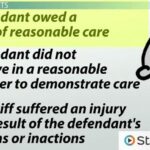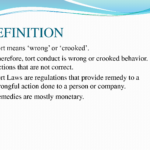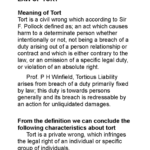What is a Tort Lawyer?






Picture this: You’re minding your own business, going about your day, when all of a sudden, you’re blindsided by someone else’s careless actions. Maybe you’re in a car accident, or you slip and fall on a hazardous property. You’re injured, and you’re not sure what to do. That’s where a tort lawyer comes in. Tort lawyers are legal professionals who specialize in helping people like you who have been wronged by the actions of another party.
Tort law is a branch of civil law that deals with civil wrongs, also known as torts. Torts can be intentional or unintentional, and they can range from physical injuries to property damage to emotional distress. If you’ve been the victim of a tort, you have the right to seek compensation for your damages. That’s where tort lawyers can step in, acting as your advocate and fighting for your rights. They can help you get the compensation you deserve for your injuries, lost wages, pain and suffering, and other damages.
Tort lawyers work on a contingency fee basis, which means that you don’t have to pay them anything upfront. They only get paid if they win your case. This makes it easier for people to access legal representation, even if they don’t have a lot of money. If you’ve been wronged, don’t hesitate to contact a tort lawyer. They can help you get the justice you deserve.
Tort Lawyer Meaning
Tort lawyers are legal professionals who specialize in civil wrongs. They represent individuals or entities that have suffered harm or injury due to the negligent or intentional actions of another party.
Roles and Responsibilities
Tort lawyers handle a wide range of cases, including:
- Personal injury
- Property damage
- Medical malpractice
- Product liability
- Wrongful death
Tort lawyers play a vital role in the legal system. They help victims of negligence or wrongdoing get the compensation they deserve. They also help to hold wrongdoers accountable for their actions.
Tort lawyers also help to shape the law by interpreting and applying statutes and court decisions. Their work helps to ensure that the legal system is fair and just.
If you have been injured or wronged by the actions of another person or entity, you may be entitled to compensation. A tort lawyer can help you understand your legal rights and options.
Tort Lawyer: Meaning and Qualifications
Asking yourself, “What’s a tort lawyer?” They’re the legal professionals who represent clients in civil cases involving personal injuries, property damage, or other wrongs. These cases are known as “torts,” and the lawyers who handle them must have specialized knowledge and skills to navigate the complex legal landscape.
So, how does one become a tort lawyer? Let’s break down the qualifications and training involved.
Qualifications and Training
To become a tort lawyer, individuals typically embark on a rigorous academic and professional path that involves three key steps: obtaining a bachelor’s degree, earning a law degree, and passing the bar exam in their respective jurisdiction.
The journey begins with a bachelor’s degree, often in a field like political science, economics, or pre-law. This foundation provides a strong understanding of legal principles and the legal system. From there, aspiring tort lawyers pursue a law degree, typically taking three years to complete. Law school coursework delves into various legal subjects, including tort law, civil procedure, and evidence.
After graduating from law school, individuals must pass the bar exam, a standardized test administered by each state. Passing the bar exam demonstrates proficiency in the law and qualifies the individual to practice law in their jurisdiction. Once licensed, tort lawyers can represent clients in court and provide legal guidance on matters involving torts.
What is a Tort Lawyer?
"Tort lawyer" is a broad term used to describe legal professionals who specialize in civil wrongs, or "torts." These wrongs can range from personal injuries to property damage to defamation. Tort lawyers represent both plaintiffs (those who have been wronged) and defendants (those who are being accused of wrongdoing).
Tort law is a complex and ever-evolving field, and tort lawyers must be well-versed in both the law and the legal system. They must also be able to effectively advocate for their clients and negotiate settlements.
Responsibilities of a Tort Lawyer
The responsibilities of a tort lawyer can vary depending on the specific case, but generally speaking, they include:
-
Interviewing clients to gather information about their case
-
Investigating the facts of the case and gathering evidence
-
Filing legal documents and pleadings
-
Negotiating with insurance companies and other parties
-
Representing clients in court
-
Advising clients on their legal rights and options
Education and Training
Tort lawyers must have a Juris Doctor (J.D.) degree from an accredited law school. They must also pass the bar exam in the state in which they wish to practice law.
In addition to their formal education, tort lawyers often receive specialized training in areas such as personal injury law, medical malpractice law, and product liability law.
Compensation
Tort lawyers can earn a variety of compensation structures, including:
-
Hourly rates: Tort lawyers may charge their clients an hourly rate for their services. This is the most common type of compensation arrangement.
-
Contingency fees: Tort lawyers may also work on a contingency fee basis, which means that they only get paid if they win the case. If they win, they will typically receive a percentage of the settlement or judgment.
-
Retainers: Tort lawyers may also charge a retainer fee, which is a flat fee that the client pays in advance. The lawyer will then deduct the cost of their services from the retainer as they work on the case.
The type of compensation structure that a tort lawyer uses will depend on a variety of factors, including the nature of the case, the lawyer’s experience, and the client’s financial situation.
Whichever compensation structure they use, tort lawyers play a vital role in the legal system. They help to ensure that those who have been wronged are able to get justice and that those who are responsible for wrongdoing are held accountable.
Tort Lawyer Meaning
A tort lawyer is an attorney who handles cases involving civil wrongs, or “torts.” Torts can include a wide range of actions, such as negligence, defamation, assault, and battery. Tort lawyers represent both plaintiffs and defendants in these cases, and they work to obtain the best possible outcome for their clients.
Specializations
Tort lawyers may specialize in specific areas of tort law, such as:
- Medical malpractice
- Employment law
- Product liability
- Personal injury
- Wrongful death
These lawyers have a deep understanding of the relevant laws and regulations, and they can provide their clients with expert guidance on their cases.
What Does a Tort Lawyer Do?
Tort lawyers handle a variety of tasks, including:
- Investigating the facts of the case
- Interviewing witnesses
- Preparing legal documents
- Negotiating with insurance companies
- Representing clients in court
Tort lawyers must be skilled negotiators and litigators, and they must be able to think critically and analyze complex legal issues.
How to Find a Tort Lawyer
If you’re considering hiring a tort lawyer, there are a few things you should keep in mind:
- Experience: Look for a lawyer who has experience handling cases similar to yours.
- Reputation: Ask around for recommendations, and read online reviews to learn about other people’s experiences with different lawyers.
- Fees: Be sure to discuss fees with the lawyer upfront so that there are no surprises later on.
Once you’ve found a tort lawyer who you’re comfortable with, you can schedule a consultation to discuss your case in more detail.
Why Hire a Tort Lawyer?
There are many benefits to hiring a tort lawyer, including:
- Expertise: A tort lawyer can guide you through the legal process and help you understand your rights.
- Experience: A tort lawyer can negotiate with insurance companies on your behalf and fight for the maximum compensation that you deserve.
- Peace of mind: Knowing that you have a skilled and experienced lawyer on your side can give you peace of mind during a difficult time.
If you’ve been injured due to the negligence of another party, don’t hesitate to contact a tort lawyer to discuss your case.